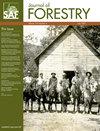第三纪遗存草木的最后原始森林具有最高的遗传多样性
IF 3.2
2区 农林科学
Q1 FORESTRY
引用次数: 10
摘要
羊驼(兽名)科赫是柏科的一种遗存物种,以前在全球分布,但现在仅限于中国南部和老挝和越南沿安南山脉的两个不相交的种群。利用核微卫星标记(cpSSR)和叶绿体微卫星标记(nSSR),对14个居群内和居群间的遗传多样性和差异进行了分析。核EST-SSR标记显示群体内遗传多样性较低(He = 0.272),群体间遗传分化较强(FST = 0.452)。老挝的人口代表了最后的原始森林,具有最高的遗传多样性,具有特别的保护重要性。cpSSR的地理变异与nSSR分析结果一致。长期的地理隔离可能是区域遗传模式的主要原因。全新世的气候变化,加上人类活动的影响,使其分布和种群规模进一步缩小。清晰的遗传结构表明,东南亚地区至少存在两个不同纬度的难民。保护和扩大其剩余栖息地和增加种群规模可能是保护该物种的最重要措施。本文章由计算机程序翻译,如有差异,请以英文原文为准。
The last primary forests of the Tertiary relict Glyptostrobus pensilis contain the highest genetic diversity
Glyptostrobus pensilis (Staunt.) Koch is a relict species in the Cupressaceae that previously had a global distribution but is now restricted to Southern China and two disjunct populations along the Annamite ranges in Laos and Vietnam. Using nuclear and chloroplast microsatellite markers (cpSSR and nSSR, respectively), we investigated the genetic diversity and divergence within and between 14 populations representing the entire range. Nuclear EST-SSR markers revealed low genetic diversity (He = 0.272) within populations and strong genetic differentiation (FST = 0.452) among populations. Populations in Laos, which represent the last primary forests of G. pensilis, contain the highest genetic diversity and are of particular conservation importance. The geographic cpSSR variation is consistent with the results from the nSSR analysis. Prolonged geographical isolation is likely to be the main reason for regional genetic patterns. Climatic changes during the Holocene, coupled with anthropogenic impacts, have further reduced its distribution and population size. The clear genetic structure suggests that at least, two refugia existed at different latitudes in Southeast Asia. Preserving and expanding its remaining habitat and increasing population sizes are likely to be the most important measures for the conservation of this species.
求助全文
通过发布文献求助,成功后即可免费获取论文全文。
去求助
来源期刊

Forestry
农林科学-林学
CiteScore
6.70
自引率
7.10%
发文量
47
审稿时长
12-24 weeks
期刊介绍:
The journal is inclusive of all subjects, geographical zones and study locations, including trees in urban environments, plantations and natural forests. We welcome papers that consider economic, environmental and social factors and, in particular, studies that take an integrated approach to sustainable management. In considering suitability for publication, attention is given to the originality of contributions and their likely impact on policy and practice, as well as their contribution to the development of knowledge.
Special Issues - each year one edition of Forestry will be a Special Issue and will focus on one subject in detail; this will usually be by publication of the proceedings of an international meeting.
 求助内容:
求助内容: 应助结果提醒方式:
应助结果提醒方式:


